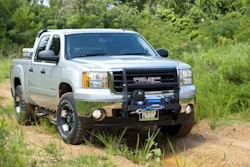Students of the light-duty diesel program at the WyoTech-Blairsville campus are not only learning how to operate, maintain and service diesel cars and trucks, they’re also getting a unique education on how to fuel them.
For the past seven years, the campus has been creating its own fuel for training engines, by collecting used fryer oil from local restaurants and recycling it into a biodiesel fuel that’s both environmentally friendly and cost-effective.
“Basically, we take waste vegetable oil from local restaurants, filter out the junk, add some chemicals, blend it with standard diesel fuel and run the mixture in our training vehicles,” said Ed Ramsden, Automotive Department Chair at WyoTech-Blairsville. “What’s cool about it is that we can manufacture this fuel for just pennies on the dollar. In our area, standard diesel fuel goes for about $4.60 per gallon, and we’re making our biodiesel for about 60 cents a gallon. It’s pretty environmentally safe, too.”
 Bringing this process to the WyoTech-Blairsville campus was the brainchild of Ken Hoffman, a Light-Duty Diesel Instructor. After reading an article about the recycling process and doing some research, he encouraged the campus to buy a processor and took the lead in collecting the used oil from a couple of local donors — primarily small restaurants that serve a lot of fried food.
Bringing this process to the WyoTech-Blairsville campus was the brainchild of Ken Hoffman, a Light-Duty Diesel Instructor. After reading an article about the recycling process and doing some research, he encouraged the campus to buy a processor and took the lead in collecting the used oil from a couple of local donors — primarily small restaurants that serve a lot of fried food.
“These restaurants are happy to give us their waste vegetable oil because they’d normally have to pay a hazardous waste fee to get rid of it,” said Ramsden. “So we’re actually saving them money by taking it off their hands.”
Hoffman rounds up the used oil in 5-gallon containers and then spearheads the recycling process. He creates 40-gallon batches at a time, which requires about a week of his spare time, yet sustains the class for about 6-8 weeks.
Periodically, he even leads small class projects whereby students adjust their own chemical ratios and create small batches of their own fuel. The class then tests each batch’s performance to see if any represents an improvement over standard factory fuel.
“Right now, every vehicle in our program runs a B20 blend, which means it’s comprised of 20 percent biodiesel and 80 percent straight diesel,” said Hoffman. “Most of our training vehicles in our shop run on this. Because we use the fuel every day, we need a constant supply.”
Hoffman admits it’s getting a bit harder to obtain the waste vegetable oil than in the past. “Because of the skyrocketing price of fuel today, many people have started making their own biodiesel to cut down their fuel costs,” he said. “Plus, several of the big food chains, already have contracts to sell their waste vegetable oil to big refineries.”
The WyoTech team has discovered only one drawback while using the homemade biodiesel — the increased potential for “cold-start” engine problems during cold-weather months. To fix the problem, they simply adjust the ratio between the biodiesel and regular diesel fuel. “All in all, it’s a real savings for us,” said Ramsden. “Our only ongoing costs are those of the chemical additives and the students learn valuable lessons in recycling.”
Hoffman agrees that all the extra effort is worth it. “Our students are very interested in this whole process,” he said. “They enjoy making the biodiesel fuel; it’s good for the environment; and it cuts down on our fuel costs. It’s a total win-win.”
WyoTech – Blairsville is located at 500 Innovation Drive, Blairsville PA, 15717. There are currently six WyoTech campuses located across the United States. These WyoTech campuses offer degree and diploma programs in the fields of automotive, diesel, collision/refinishing, motorcycle, marine technology, as well as construction trades. In addition, WyoTech offers advanced training programs in applied service management; advanced diesel; light duty diesel; advanced automotive diagnostics; street rod and custom fabrication; motorsports chassis fabrication; high performance power trains; and trim and upholstery technology. For more information, go to www.wyotech.edu.
For more information about our graduation rates, the median debt of students who completed the program, and other important information, please visit our website at www.wyotech.edu/disclosures.






